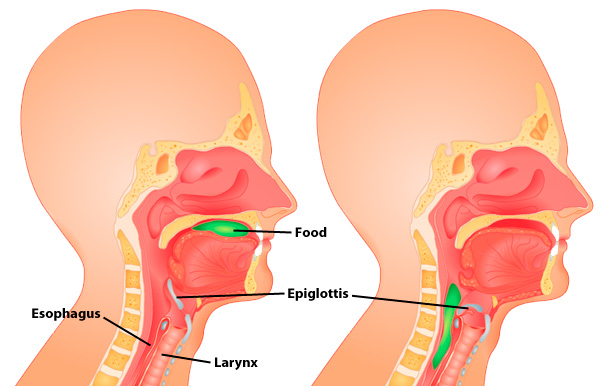Alcohol is irritating to the stomach. There are nerve endings in the stomach that send a signal to the brain that something harmful is present. Also, an area of the brainstem senses the amount of alcohol in the blood, and if it’s high, the brain responds by sending a neural signal back down to the stomach to get rid of the alcohol-i.e., vomit. This is a protective mechanism against drinking too much alcohol. However, vomiting when intoxicated or “drunk” can cause death by aspiration pneumonia. Normally there is a flap of tissue (epiglottis) that folds over backward to cover the entrance of the breathing tube (larynx) when one swallows so that food goes down the esophagus to the stomach and not down the windpipe to the lungs. At high concentrations of alcohol in the body, the muscles that control the epiglottis become slow to react or even paralyzed and any food that is vomited up from the stomach may find its way back down into the breathing tube, especially if one is taking in a breath (aspiration). When the acidic stomach contents reaches the lungs, it is corrosive to the lung tissue, and it triggers a rapid infection of the lungs that results in a fatal form of pneumonia.
 The epiglottis near the bottom of the throat closes during swallowing to direct food into the esophagus and away from the larynx (left), which leads to the lungs. Ethanol intoxication can paralyze the epiglottis, and if one vomits, the stomach contents can reach the lungs (right), causing pneumonia and death.
The epiglottis near the bottom of the throat closes during swallowing to direct food into the esophagus and away from the larynx (left), which leads to the lungs. Ethanol intoxication can paralyze the epiglottis, and if one vomits, the stomach contents can reach the lungs (right), causing pneumonia and death.
 The epiglottis near the bottom of the throat closes during swallowing to direct food into the esophagus and away from the larynx (left), which leads to the lungs. Ethanol intoxication can paralyze the epiglottis, and if one vomits, the stomach contents can reach the lungs (right), causing pneumonia and death.
The epiglottis near the bottom of the throat closes during swallowing to direct food into the esophagus and away from the larynx (left), which leads to the lungs. Ethanol intoxication can paralyze the epiglottis, and if one vomits, the stomach contents can reach the lungs (right), causing pneumonia and death.